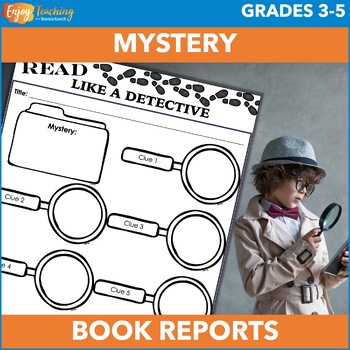Mystery Book Report Templates with Vocabulary, Practice, and Two Fun Options
- PDF
Also included in
- Read, write, and think like a detective! Bulk up your mystery genre study with inference activities, short stories, writing projects, secret codes, observation, logic puzzles, fingerprinting, and invisible ink! This unit is guaranteed to engage your third, fourth, or fifth grade students.Open the prPrice $28.80Original Price $36.00Save $7.20
- Five weeks of detective-themed ELA activities engage fourth and fifth grade students. The unit includes mystery reading, critical thinking, and writing projects; two novel studies; a simulation; posters and book report templates. A complete 25-day schedule guides instruction. Open the previews to taPrice $49.60Original Price $62.00Save $12.40
Description
Read and map mysteries! This set offers two templates for book reports. You can choose a printable graphic organizer or puzzle-piece craft. To prepare kids, a one-page handout introduces related terms, and a two-page story provides practice.
Open the preview to take a closer look.
First, introduce or review vocabulary with a simple handout.
- Alibi - an excuse that shows the suspect was not guilty
- Case - a set of circumstances in an investigation
- Clue - evidence used to solve a mystery
- Crime - an act that is against the law
- Deduction - making an inference based on evidence
- Evidence - factual information in a case
- Motive - reason a person does something
- Mystery - something that is difficult to understand
- Red herring - a false clue
- Sleuth - detective
- Suspect - person who is thought to be guilty
Second, read a short story and map it. "The Case of the Missing Cookies," lets kids practice the process they'll use for their book reports. Independently, in small groups, or as a class, students use a template to identify the mystery, clues, and red herrings. Then they use deductive reasoning to find the solution.
Finally, ask kids to read a mystery and map it. You can choose from two book report templates.
- They can use the same one-page organizer used in the practice activity.
- For a crafty option, ask them to cut out jigsaw puzzle pieces, write the mystery, clues, red herrings, and solution on them, and then glue them to a large sheet of construction paper. Then they use arrows to create a flow chart of the story.
Resources are available in printable and digital formats.
- A PDF provides a reproducible option.
- Forced Google Slides let kids complete activities online.
Want your students to read, write, and think like detectives? Add these resources to build an entire mystery genre study.
- Read some mystery passages. Kids practice inferring and find codes to solve five mysteries.
- Challenge kids to write mysteries. This resource includes three different writing activities.
- Provide a variety of detective activities, including secret codes, logic puzzles, observation, invisible ink, and fingerprinting.
- Or grab the 5-week mystery unit, which also includes novel studies, posters, a book report project, and lesson plans.
Enjoy teaching!
Brenda Kovich
Would you like to be notified when I post new resources? Just follow me on TPT!







